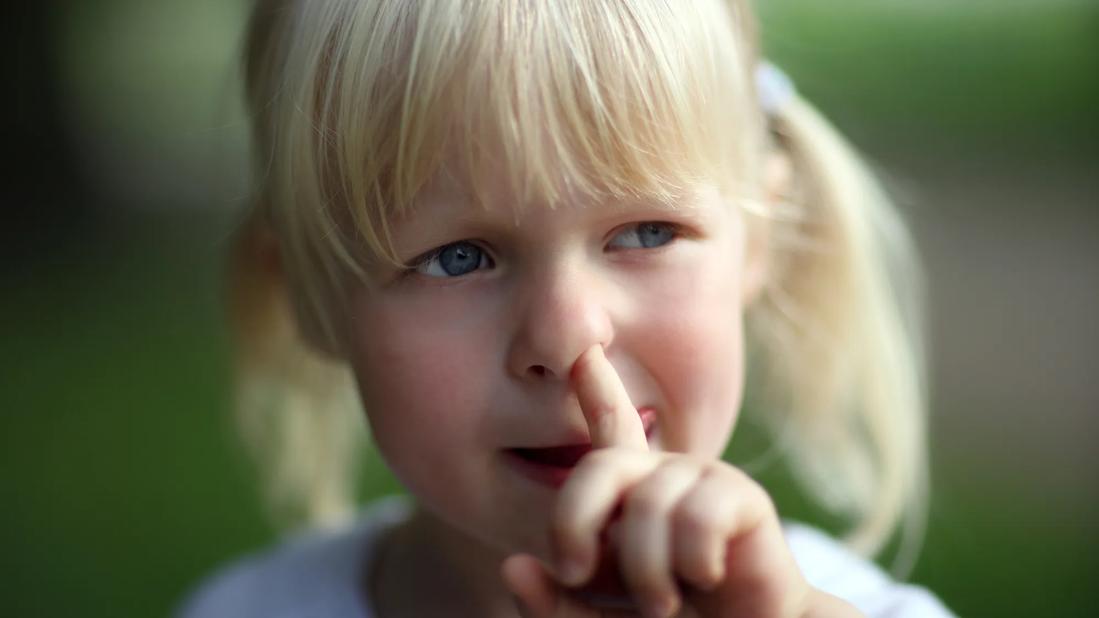Picking your nose and eating the results isn’t polite behavior, but odds are, it won’t make you sick

Image content: This image is available to view online.
View image online (https://assets.clevelandclinic.org/transform/b31cc3ce-4ec8-48d3-bb0b-3b299db2851d/child-picks-nose-144346055)
Child with finger in their nose
Picking your nose is generally frowned upon and widely considered socially unacceptable. Eating any boogers excavated during a finger-in-your-nostril mining session is just considered … well, icky.
Advertisement
Cleveland Clinic is a non-profit academic medical center. Advertising on our site helps support our mission. We do not endorse non-Cleveland Clinic products or services. Policy
Frankly, there’s no good reason to eat a booger. But if you do snack on one of those greenies, is it actually bad for you?
Let’s dig for an answer with primary care physician Matthew Badgett, MD.
While the thought of eating crusty or slimy boogers may make you queasy, ingesting the substance probably won’t make you sick, says Dr. Badgett.
In fact, odds are that everything in a booger already finds its way to your stomach.
After all, boogers are mostly dried-up mucus, a slippery fluid your body produces in abundance to trap germs and particles floating around us. Your body makes about 1.5 quarts of mucus per day. You unknowingly swallow most of it. (Yuck, right?)
Other ingredients in boogers include dust, pollen, dirt and various germs — or basically, anything that’s typically sucked into your nose from the air you breathe.
“Are there bacteria and other stuff in boogers? Of course,” says Dr. Badgett. “But if these things got trapped in a booger in your nose, you can bet they’re also making their way into your throat and stomach, too. It’s all connected.”
Plus, whatever boogers land in your tummy won’t last long once they splash down into your stomach acid. (“That’s a pretty big defense mechanism,” notes Dr. Badgett.)
Advertisement
But just because boogers aren’t likely to cause harm doesn’t mean that you should eat them. They’re not a delicacy (though some toddlers might disagree). They’re not nutritious in any way either.
“There really isn’t a good reason to eat boogers,” emphasizes Dr. Badgett. “This may seem obvious, but it’s not recommended.”
So, what prompts someone to harvest a booger for consumption? There are multiple explanations, says Dr. Badgett, including:
While boogers themselves might not be particularly harmful, clawing them out can come with consequences such as:
“There’s a point where picking your nose can become a destructive sort of behavior,” cautions Dr. Badgett. “You can introduce problems you don’t want to have.”
Understanding why you’re picking your nose is the first step toward breaking the habit, says Dr. Badgett. With that in mind, here are a few tips to put a stop to it.
Advertisement
As for toddlers picking their nose with gusto, most eventually lose interest in the exploration. “They usually stop once they get bored with it,” reports Dr. Badgett. “Or it can end once they get older and see it’s not something their friends are doing.”
If you don’t want to wait for that process to work its way through, talk to them about the behavior and reinforce that it’s not socially acceptable. Ditto for eating whatever they find when they’re picking.
“Be consistent and clear, not harsh or punitive,” he advises. “Eventually, their behavior should get better.”
And until that time, rest easy knowing boogers shouldn’t make them sick.
Advertisement

Sign up for our Health Essentials emails for expert guidance on nutrition, fitness, sleep, skin care and more.
Learn more about our editorial process.
Advertisement
How to handle the thicket of long hairs sprouting from your nose
Reduce unnecessary antibiotics to help your immune system
Openness, conscientiousness, extraversion, agreeableness and neuroticism all shape your core identity
Changes in your child’s emotions, behavior, sleep and appetite can all point to depression
‘Tune wedgies’ can play on repeat due to your brain’s storage and operating system — and something known as the phonological loop
Neti pots can be useful for sinus pressure relief and removing excess mucus
Autism and OCD often co-occur, but distinguishing between them is crucial for successful treatment
School can be stressful, even anxiety-provoking — get to the root of the concern and enlist help when needed
Although it could be used as a moisturizer, this new trend is not recommended
Communicating clear limits helps protect your time, energy and emotional well-being
High cholesterol can be genetic, but testing and treatment can lower your heart disease risk